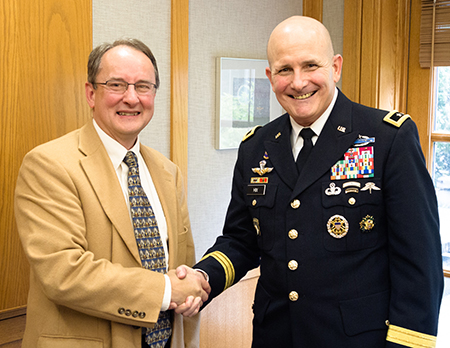The University of Washington’s commitment to military veterans runs deep.
That commitment is symbolized by a series of campus monuments that recognize alumni who gave their lives in service to their country. Along Memorial Way, 58 sycamore trees commemorate UW students and faculty who died in World War I. Inscribed on the flagpole at the south end of Memorial Way are the names of staff, faculty, students and alumni killed in World War II. The Medal of Honor Memorial, erected in 2009, pays tribute to eight alumni who have earned the nation’s highest military honor. Except for Medal of Honor recipients who served in Korea and Vietnam, the veterans of Korea, Vietnam, Iraq, and Afghanistan are not yet recognized by a campus monument. I hope someday they will be.
Even more important than monuments, however, is the support we owe to the thousands of veterans and active duty military personnel who teach, work, and study on our three campuses. This issue of Perspectives newsletter highlights some of the ways in which members of this university, individually and collectively, are working to provide that support.

We are currently in the midst of Veteran’s Week (November 1-12), when events on all three campuses focus on the presence, too easily overlooked, of the many thousands of veterans who are part of Husky Nation. A full listing of Veteran’s Week events can be found at www.washington.edu/alumni/veterans/. I urge you to attend an event if you can.
November will also see the opening of a new Office of Student Veteran Life on the Seattle campus. Located in Room 327 of the Husky Union Building, this office will bring a new focus to our veteran support services. The members of Husky United Military Veterans, a registered student organization, have worked hard for several years to make this new office a reality. With the support of Lincoln Johnson and others in the Office of Student Life, they have succeeded.
For reasons some of you may know already, veterans’ issues are personal to me, as they are for many of you. My son was not a Husky, though I hoped that someday he might be. Instead, he joined the Marines straight out of high school. He served on four combat deployments to Afghanistan and rose to become a sergeant. He was killed in action on the last of these deployments, doing what he had always dreamed of doing, commanding Marines in combat. His memory is always with me, but never more so than in November, as we remember the contributions and honor the sacrifices that military veterans have made on our behalf. To them all I say a heartfelt “thank you.”